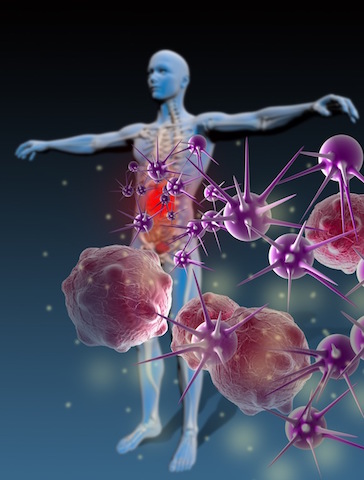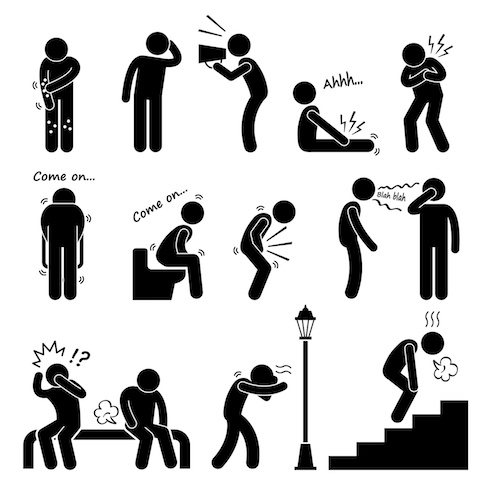Antioxidants Combat Diseases
So, how do antioxidants combat diseases?
Answer:
Antioxidants neutralizes the free radicals that cause us to be sick and that which create the diseases in our bodies, and can also help build immunity in the body by building or maintaining healthy cells.
To find out how free radicals cause diseases in our bodies, check out "Free Radicals and Oxidation" page, or click on the tab "Free Radicals and Oxidation" above.
And if you are unsure what are antioxidants, check out "What Are Antioxidants?" page, or click on the tab "What Are Antioxidants?" above.
Diseases ... Categorizing Them ...
First, let's try and understand the type of diseases there are.
In board terms, diseases can be categorized into:
- Degenerative diseases - that which are caused by the free radicals.
- Infectious diseases - that which are caused by the germs - virus, fungi, parasites, mycoplasma, and the like.
 Human Body Under Constant Attacks
Human Body Under Constant Attacks... and Sub-Categorizing Them ...
And like all good sciences, the above two main categories can be further sub-categorized ... see below.
Side Note:
For ease of referencing and searching on this site, I will attempt to categorize them, too, in case ...
Some folks might want to look for a specific disease's information and
how antioxidant counteracts this particular disease.
Now, while science wants to pigeon hole them in neat little categories/groups, Nature, of course, can operate differently. So, one disease can lead to another, and one disease can have many symptoms. Trying to link them - being a non-medically trained person, but only someone interested in health sciences - will be a challenge but I will attempt, as best a logical sorting or categorization as possible, from a lay perspective.
World Health Organization's Classification of Diseases
World Health Organization (WHO) has a defined classification of diseases.
For those interested in WHO's classification, here's the link:
http://apps.who.int/classifications/icd10/browse/2015/en
While I attempt to follow WHO's classification, it may get too
technical. For example, while I would like to write about inflammation
and antioxidant, in the WHO's list, inflammation appears in different
categories. In instances like these, I will have to have a separate
category or list the diseases where I think most folks would search for
it.
Let the List begins ...
Categorization of Degenerative Diseases
- Neoplasms (divisions of mutated cells)
- Examples:
Cancer
Tumor
- Diseases of the Blood
- Endocrine Diseases
- Examples:
Thyroidism
- Metabolic Syndrome (is a cluster of conditions - high blood
pressure, high blood sugar, excess body fat (typically around the waist)
and high level of bad cholesterol or low level of good cholesterol)
- Examples:
Diabetes
Hyperlipidemia (high level of fats in the blood)
Arteriosclerosis (thickening and hardening of artery walls)
Fatty Liver (build up of fats in the liver)
Hypertension (high blood pressure)
Obesity (being over weight)
- Diseases of the Nervous System
- Diseases of the Eye and Adnexa
- Diseases of the Ear and Mastoid Process
- Diseases of the Circulatory System
- Diseases of the Respiratory System
- Diseases of the Skin and Subcutaneous Tissue
- Diseases of the Musculoskeletal System and Connective Tissue
- Diseases of the Genitourinary System
- Ischemia (restriction or cut-off of blood supply)/reperfusion (restoration of blood supply) injuries
- Examples:
Cerebral Infraction (stroke caused by blockage)
Myocardial infraction (heart attack)
Organ transplant
Post Cardiac Arrest (resuscitated heart after the heart stopped)
- Mitochondrial Diseases
- Aging
- Examples:
Wrinkles,
Freckles
- Hemodialysis
- Examples:
Cystisis
- Inflammation
- Examples:
Rhematoid arthritis
Wound healing
Bowel disease
- Neuroprotection
- Examples:
Dementia
Parkinson Disease
Depression
- Medication Induced
- Examples:
Anesthetia
Radiatheraphy
Chemotheraphy
- Stress Induced
- Examples:
Exercise
Fatigue
And How Do Antioxidants Combat Degenerative Diseases?
Simply ... Antioxidants neutralizes the free radicals, and repair cell damages.
Categorization of Infectious Diseases
Technically speaking, there is only one categorization - that is, "Infection".
But for purposes of understanding the types of infections and hence, their treatments, infectious diseases are sub-categorized by the agents that cause these infections.
- Bacteria Infections
- Examples:
Strep throat
Tuberculosis
Urinary tract infections (UTI)
- Virus Infections
- Examples:
AIDS
Common cold
Ebola hemorrhagic fever
Genital herpes
Influenza
Measles
Chickenpox and shingles
- Fungi Infections
- Examples:
Thrush
Athlete's foot
Ringworm
- Protozoa Infections
- Examples:
Giardia
Malaria
Toxoplasmosis
- Helminths Infections
- Examples:
Tapeworm infection
Roundworms infection
Heartworms infection
When Does An Infection Becomes A Disease?
With infectious disease, the disease only occurs when the infection causes damages to the cells. Hence, it's technically a 2-stage process:
- Stage 1 - Infection Stage - infection occurs - that is, invasion of the germs in the body or the cells. If this can be treated before cells damages are caused, technically, it would not be classified as a disease. In most cases, the body immune system kicks in to counter these invasions.
- Stage 2 - Disease Stage - the infection causes cells damages. Usually, when the immune system fails and/or medication fails to contain the invasion, the cells are damaged, leading to the disease stage.
So, Where Do "Germs" Fit In?
In case you are wondering ...
Well, germs are the "bad guys" population of the above that causes the infections, and the subsequent diseases if the infection is not brought under control.
But, then you might ask ... there are good bacteria and bad bacteria, aren't there?
Only the bad bacteria are called germs.
And How Do Antioxidants Combat Infectious Diseases?
Antioxidants aid in 2 ways:
- Building or maintaining healthy immune cells to fight the invasion
- Countering the cell damages caused by the invasions/infections
And where the infections results in free radicals being created, antioxidants will neutralize the free radicals, too.
Other ways to classify diseases
Out of interest, besides the WHO's listing of diseases, there are other ways diseases are categorized:
- Manifestational Vs Etiological
- simply, looking at symptoms Vs looking at the causes
Some other definitions of interest ...
These are some definitions, which may interest some folks, distinguished simply:
- Diseases - a biological disorder.
- Illness - a personal feeling or experience of ill health. For example, a person may feel ill but there is no diagnosis of a diseases - such as, a chronic fatigue syndrome patient may feel ill but there may be no physical symptoms of disease identified.
- Sickness - is a broader term used to describe a disease and/or illness.
- Symptoms Vs Conditions/Signs - Conditions/Signs of a diseases are usually visible and/or that determined from tests (more objective), whereas symptoms have some degree of subjectivity attached to it.
- Syndrome - a set of medical conditions/signs and/or symptoms, specific to an illness or disease.
- Healing Vs Recovery - Healing is the process but Recovery is healing to a point prior to the injury/disease. For example, a person's broken leg may heal but it may never recover fully (back to the same/similar condition or conditions of use prior to the injury).
I am not trying to demonstrate an English lesson here but simply, listing these for the interest of some. Nor, are the above the only definitions ... but only to give a flavor of what the words may mean when one reads a health article, for the benefit of some.
 Symptoms? Or Signs?
Symptoms? Or Signs?Different Stages of Resultant Damages
What are the resultant effects of these diseases? - distinguished simply:
- Impairment - a reduced or diminished function of a body part.
- Disablement - loss of a function
- Made handicap - similar to disablement, but in reference to the individual's function with his/her environment.
- Fatality/Death
Again, these are not the only definitions around, but will provide some distinctions for some readers' understanding.
Expansion of the List (in the future)
Why list these diseases when the simply answer on how antioxidants combat diseases is just simply that antioxidants neutralize the free radicals ... and bingo, the disease is overcome and the body/cells are healed.
My intent is to add information pertaining to each disease or group of diseases, and on how antioxidants can (possibly) aid in each case.
Each topic will require a lot research. Hence, it will be added through time. Hope you will check back with us from time to time, to see what's been added and what's new.
Bearing in mind ...
The pages on this site are not meant to diagnose nor cure, and especially not to counter any medical advise given. (Please see disclaimer)
The information on this site are purely for informative and educational purposes only. I am not a medically trained person. I only wish to share what I have learned through the years and through my own medical journey, and through my own research, as I had briefly described in my home page.
My intent is to provide easy to understand "starter" information, in hope that they will spur you on to discover more ways to gain or re-gain your health, in simple and natural ways ... perhaps starting with antioxidants? ;-)
Last but not least, as with most, if not all, website owners we can't be responsible for any third party sites.
Good Health ... can be had in simple and natural ways.
May you enjoy Good Health always!!!
Do you have a PASSION you want to share with the world??? What better exposure than the INTERNET?!!!
Want to consider?
Well, you will need a place to "host" (place) your site, then the tools to build, run as well as track the performance of your Masterpiece!
OR, if you already have a site, but find that you are paying too much for tools and apps to run and track your site ...
Here's an All-in-One Solution for you! Hosting, as well as Tools to build, run and track!
